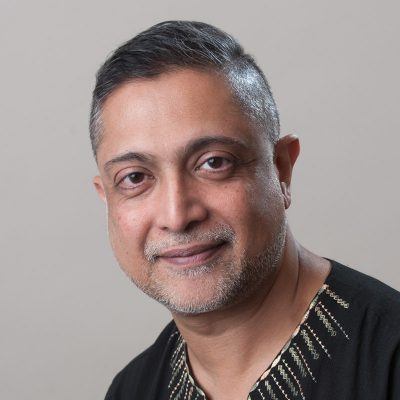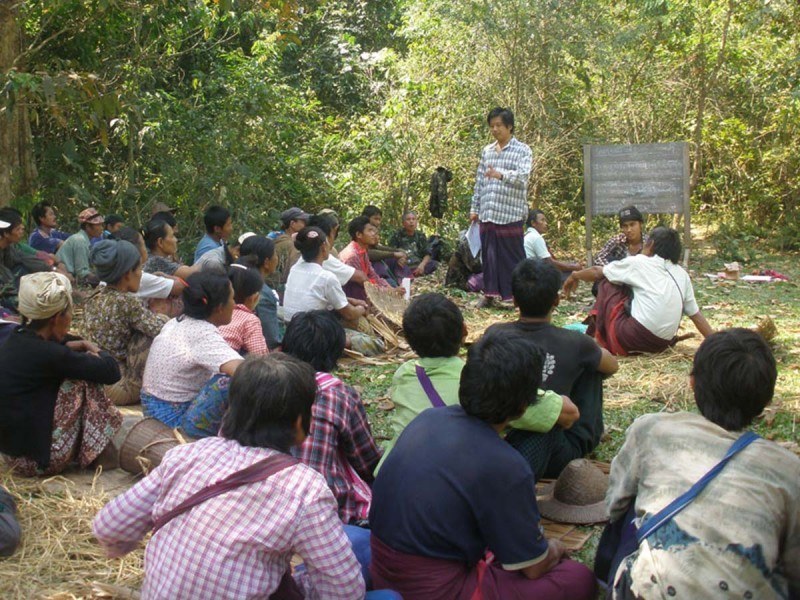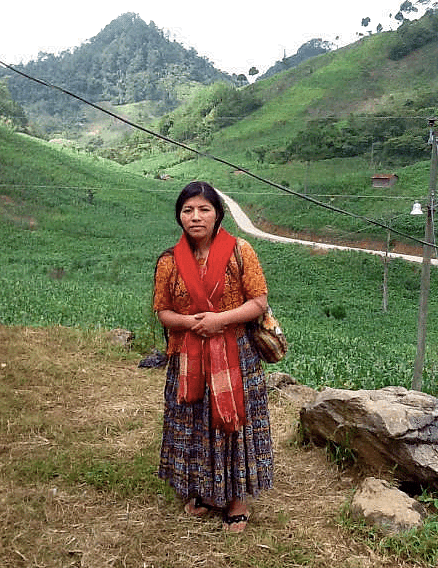“The Time of Suffering”—what the Q’eqchi’ Mayans call the 30 plus years of conflict that ended in the mid 1990s—hit hard in Alta and Baja Vera Paz, two departments in north-central Guatemala that faced brutal massacres and violence. AJWS grantee Union of Peasant Organizations of Vera Paz (UVOC) works in this region. UVOC is a movement of indigenous small farmers, mainly Q’eqchi’ and Poqomchi’ ethnic groups, that organizes Mayan communities to advocate for their rights to land and traditional territories, land they depend on for survival. UVOC is organized as a federation of community councils with leaders chosen from their communities, who in turn choose the general council.
My AJWS colleagues and I traveled to Cobán, the capital of Alta Vera Paz, to meet with Carlos and Jorge Luis Morales, two brothers who together founded UVOC, and hear their story.
“I remember my father, a farm worker, being whipped by the landowner,” Carlos told us. “We couldn’t raise our eyes to them,” Jorge Luis added. “The fancy boots with spurs the landowners wore will forever be etched in my mind!”
Carlos left for Guatemala City when he was just 14. He joined the struggle for a more just society, spending many years in exile. Jorge Luis left too; he got an opportunity to go to school in Guatemala City, and later studied law. After the peace accords were signed in 1996, ending the 36-year brutal civil war, Carlos returned to Vera Paz to found the organization UVOC. His brother Jorge Luis came back to serve as UVOC’s lawyer. UVOC began working with 16 communities, focusing on land reform among other issues.

UVOC uses a popular education model to organize, now working in over 360 communities, and incorporates gender equity as part of its mission. Not always an easy thing, especially when one confronts machismo overlaid with traditional indigenous notions of what makes a leader. According to Maya tradition, leaders are born on days that exude strong leadership energy. While that doesn’t have anything to do with one’s gender, machismo often seems to exude a stronger energy!
Throughout history, the indigenous communities in Vera Paz have continuously been stripped of their land and natural resources. First, through Spanish colonization. Then, in the 19th century, the government of Guatemala enticed German farmers to immigrate and settle in the area, giving them land for coffee cultivation. They disregarded the land inhabited by indigenous Mayans; overnight the Mayans were reduced to being landless labor on the fincas (plantations). Today, that land is also being used for palm oil plantations and hydroelectric dams.
A few governments have tried some limited land reform, including basic protections for landless labor. But the large landowners, one of the most powerful political interests in the country, are resisting and trying to get out of even the smallest commitments. And UVOC’s members have faced violence and repression for their work. UVOC was forced to create a safe house in order to ensure the safety and security for their members and leaders.
UVOC is a community-based organization. It is primarily self funded, with a few donors including AJWS. Each family puts in a small amount of quetzals (the Guatemalan currency)—whatever they can afford. This affords them a sense of ownership, belonging and accountability. UVOC has been successful in securing land titles in some places and has negotiated with some 40 fincas for landless workers. However, they have had to pay a high price for their work. In addition to the violence they’ve faced, they’ve also faced a number of charges, and high bail amounts for members who have been arrested under false pretexts. Jorge Luis certainly has had his work cut out for him.
“Even the best legal strategies, though, need social pressure,” said Sandra Caled, another UVOC leader, adding, “organizing is imperative!” Therefore, UVOC encourages its members not to accept the bolsa solidária, a government handout for landless families. UVOC trains them instead to grow their own food, so as to not weaken their struggle by becoming dependent.
That organizing is not just for community members. Like Sandra’s children who are reviving Mayan cultural traditions for a new generation, Carlos’s son and Jorge Luis’s daughter are in the movement too. Carlos’s son works with youth members of UVOC, training them on community radio programming in Mayan languages. And Jorge Luis’s daughter has traveled to Brazil to study at the MST (Landless Workers Movement) school, so she can come back to be an organizer and educator for UVOC.
They’re not lowering their gaze any time soon.
AJWS’s work in countries and communities changes over time, responding to the evolving needs of partner organizations and the people they serve. To learn where AJWS is supporting activists and social justice movements today, please see Where We Work.





